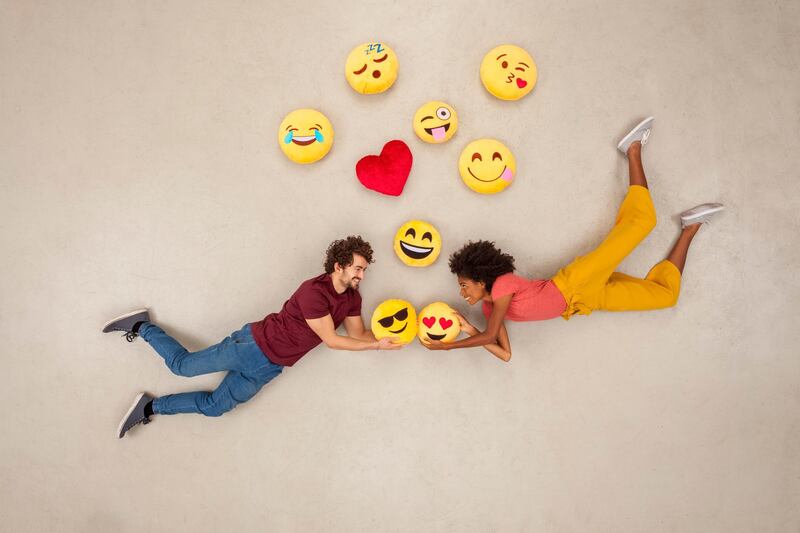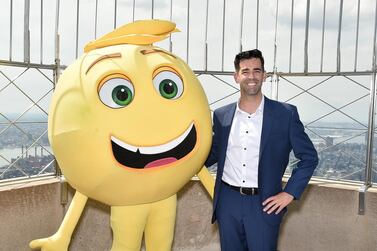Latest: What do emojis mean? How millennials and Gen-Z use them very differently
Facebook has revealed the most popular emojis in the Mena region, and it seems we are a bunch of romantics.
Aside from the two variations of laughing crying emojis, the other eight are love-related. The black and red hearts both feature, the classic red in two varieties, as well as a shiny heart. Heart eyes, blowing a kiss and a red rose are also in the top 10. Sadly, but perhaps inevitably, the broken heart emoji completes the list.
Top 10 emojis in the Middle East 2020:
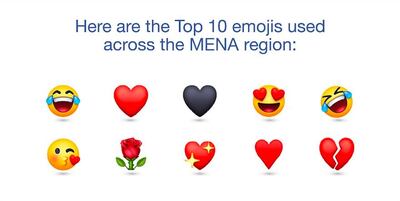
Face with tears of joy 😂
Red heart ❤️
Black heart 🖤
Smiling face with heart-eyes 😍
Rolling on the floor laughing 🤣
Face blowing a kiss 😘
Rose 🌹
Sparkling heart 💖
Heart suit (♥️)
Broken heart (💔)
Most popular emojis by country: UAE, Saudi Arabia, Egypt, Lebanon, Morocco, and Algeria
The social media site has also broken its data down by country, to reveal its three most popular emojis. Every one of them has a heart and the classic crying laughing symbol somewhere in the top three.
UAE users favour two variations of the crying laughing emojis, with the red love heart; while Saudi Arabia's Facebook users lean towards the classic crying laughing emoji and a red heart, but also use the red rose.
Egypt, Lebanon and Morocco have an identical top three of the classic crying laughing emoji, red and black love hearts.
Of the six countries listed, Algeria is the only country to not have a red love heart in a podium position. The North African country's Facebook users plump for the laughter emoji, along with a black heart and red love-heart eyes.
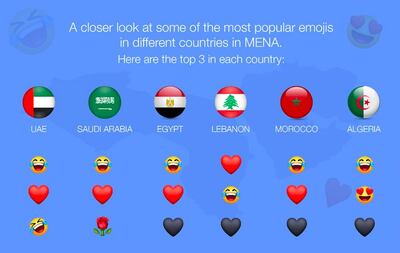
A sign of the times, use of the face with medical mask emoji is also gaining popularity in the region, according to Facebook's data.
The site has seen it used in more than 3.4 million posts in Egypt and Algeria, 1.2m posts in Morocco, 900,000 posts in Saudi Arabia and 600,000 posts in the UAE.
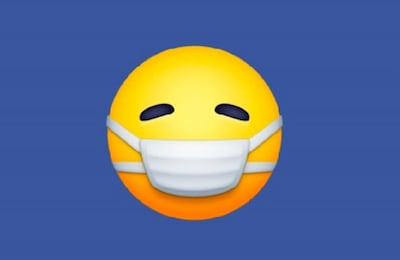
In a bid to remain hopeful, Facebook's data concluded: "Yet, hearts and laughing smileys are still the most popular forms of expression, pointing to the positive mindset that still resides in communities even as we navigate unfamiliar and challenging times."
It was World Emoji Day on Friday. The expressive symbols date back to 1997, when a version was first developed by Japanese network carrier SoftBank. It released a set of 90 unique emojis, which were black and white pixelated line designs. The characters included the thumbs up, heart and smiley faces. Two years later, another Japanese telecom company, NTT Docomo, released 176 original emojis in colour.
Though emojis were used on webpages and online messaging over the years, it was in the 2010s that the use exploded, after a set of about 700 were internationally standardised in 2009 and Apple added an emoji keyboard to its operating system in 2011.
On Thursday, ahead of World Emoji Day, Apple announced it would be launching a boomerang, a ninja and a set of lungs among new 13 symbols.
👀 First look: Apple previews new emojis coming to iOS including Lungs, Ninja, and Bubble Tea #WorldEmojiDay https://t.co/C0RK3THL7M pic.twitter.com/WVArYL9jx4
— Emojipedia (@Emojipedia) July 16, 2020
However, it seems we may not get too many more.
“The emoji keyboard has broadened in recent years,” Jeremy Burge, chief emoji officer at Emojipedia, said at the launch, in reference to several campaigns for the symbols to better reflect the diversity of their legion of users. “It’s had skin tones added, nearly every emoji has a consistent set of three options for gender now, including a neutral option.”
“[But] I don’t think anyone wants a keyboard that dramatically expands to tens of thousands of emojis,” he said. “I think the value comes from the fact that they are a limited set.”
Read more: Facebook launches new 'Hug' reaction button in response to coronavirus
